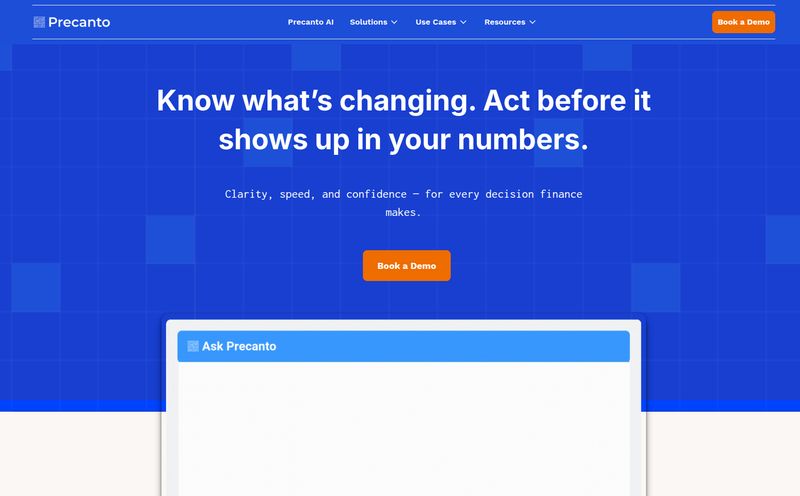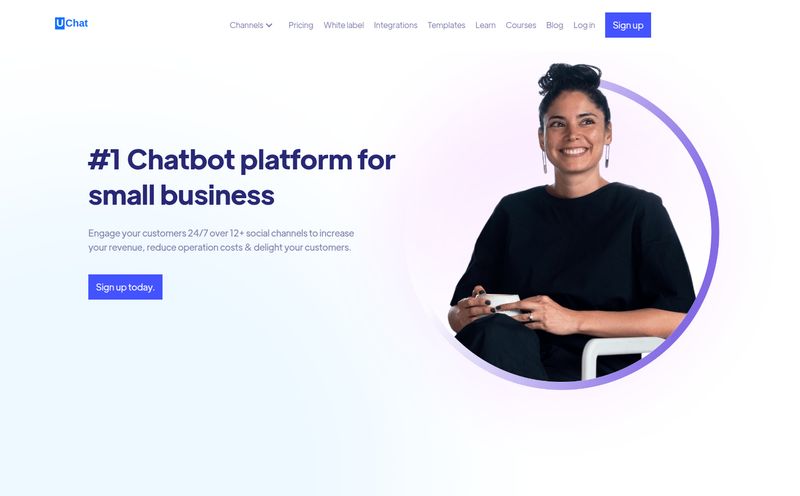We've all been there. It's the end of the quarter, the pressure is on, and you're staring at a pipeline that looks more like a garden hose than a fire hydrant. The life of a Sales Development Representative (SDR) is a grind. It’s a relentless cycle of list building, cold emailing, LinkedIn stalking, and getting shut down. It’s repetitive, it's exhausting, and frankly, it's where good talent goes to burn out.
For years, the solution was just... more. More reps, more coffee, more frantic activity. But what if the solution isn't more people, but better tech? I’ve been in the SEO and traffic game for a long time, and I've seen countless tools promise to revolutionize sales. Most are just glorified email schedulers. But every now and then, something comes along that makes you lean in a little closer. That's how I felt when I started looking into Jeeva.ai. It's not just another tool; it’s positioned as a fully automated AI SDR. A digital team member that never sleeps. Intriguing, right?
What Exactly is Jeeva.ai? (And Why Should You Care?)
So, what is this thing? At its heart, Jeeva.ai is an agentic AI platform designed to take over the entire top-of-funnel sales process. Think of it less as a piece of software and more as a new hire. It’s the tireless, 24/7 SDR you've always dreamed of—one that finds leads, enriches their data, writes personalized outreach, follows up relentlessly, and even handles initial objections. All while your human team focuses on what they do best: building relationships and closing deals.
This isn't just about sending a thousand generic emails. The whole idea is to mimic the workflow of a high-performing human SDR. It’s about creating personalized outreach at a scale that’s just not possible for a person. I've always said that the future of sales isn't about replacing humans, but augmenting them. Jeeva seems to be built on that very idea. It handles the grunt work, so your closers can have more meaningful conversations.

Visit Jeeva AI
The Core Features That Actually Matter
A feature list is just a list until you see how it all fits together. With Jeeva, the features combine to create a seamless, automated workflow. It’s pretty slick, I have to admit.
From Discovery to Done Deal: The Automated Funnel
It all starts with leads, obviously. Jeeva’s platform includes Lead Discovery & Enrichment. It can pull from your existing CRM (like Hubspot, thank goodness) or its own database to build a list of ideal prospects. But it doesn't stop there. It then enriches this data, finding the details needed for that personal touch we’re all chasing. From there, it kicks off its AI Outreach across multiple channels—we're talking email, LinkedIn, you name it. It's a full-court press, completely automated.
The "Human" Touch: Smart Follow-ups and Objection Handling
Here’s where my ears really perked up. Most automation falls flat when it gets a response. But Jeeva is designed for Objection Handling. Someone says, "Not interested right now"? The AI doesn't just give up. It's trained to respond intelligently, trying to keep the conversation alive. Same goes for its Smart Follow-Ups. It’s not just a pre-set, 7-day cadence. The AI adapts based on prospect behavior. This is the part that feels a little like sci-fi, but when you see it in action, it starts to make a lot of sense.
AI RevOps and Getting Context
The final, and maybe most important, piece of the puzzle is the handoff. Jeeva provides Context Before Every Call. When the AI successfully books a meeting, it doesn’t just throw a calendar invite over the wall. It provides your human rep with a full summary of the interaction so far. No more of those awkward, "So... what did you want to talk about?" moments. Your closer walks in with all the background knowledge, ready to have a productive conversation. It’s a small thing that makes a huge difference.
Putting Jeeva.ai to the Test: How it Works in the Real World
Their website boils it down to a simple, three-step process:
- Get Verified Leads: You plug in your ideal customer profile and either connect your CRM or use their database. The system gets to work finding the right people.
- 24/7 AI Outreach: The AI agents start their multi-channel campaigns. While you're sleeping, having dinner, or you know, on a sales call, Jeeva is prospecting. It’s a weirdly comforting thought.
- Inbox Sorted -> Calendar: Positive replies and meeting requests are automatically filtered and booked directly onto your sales team’s calendar. The dream of a self-filling calendar is finally here.
I’ve seen a lot of platforms try to do this, but the integration with existing tools like Hubspot and the sheer intelligence of the objection handling are what seem to set Jeeva apart. It’s not just automating tasks; it’s automating a strategy.
The Big Question: What Does Jeeva.ai Cost?
Alright, let's talk turkey. Pricing is always the deal-maker or breaker. From what I can see on their site, Jeeva has shifted to a much more accessible, tiered model which is great news for teams of all sizes. Originally it seemed to be a 'contact us for a demo' only service, but now they lay it all out.
Here’s a quick breakdown of their plans:
- Free Plan ($0/month): This is basically a trial on steroids. You get one seat and 14 days to kick the tires. It includes the lead finder and basic automation. Perfect for a solopreneur or a sales manager who wants to test the waters without getting finance involved.
- Essentials Plan ($16/seat/month): This steps it up a notch, adding email templates, advanced search filters, and proper email sequencing. A solid choice for small, scrappy teams.
- Growth Plan ($40/seat/month): This seems to be the sweet spot and their most popular offering. You unlock the good stuff here: the AI-powered builder, team collaboration features, and API access. If you're serious about automating outreach, this is likely your starting point.
- Scale Plan ($80/seat/month): For larger teams who need it all. This plan includes advanced AI identifying features and dedicated priority support.
- Enterprise Plan (Custom Pricing): The full white-glove service. We're talking real-time syncs, advanced security compliance, and a dedicated Customer Success Manager. This is for organizations ready to fully integrate an AI SDR workforce.
This tiered structure is smart. It lets you grow into the platform, rather than having to jump into the deep end from day one.
The Good, The Bad, and The AI
No tool is perfect. As an SEO and traffic guy, I'm naturally skeptical. It's important to look at both sides of the coin before you commit to a new peice of tech in your stack.
Where Jeeva Shines
The biggest win here is obvious: time. The amount of manual, repetitive work Jeeva automates is staggering. It frees up your expensive, talented sales reps from the drudgery of prospecting so they can focus on revenue-generating activities. The 24/7 engagement is also a massive advantage. Leads are hottest when they first show interest, and having an AI that can engage them instantly, day or night, is a proven way to boost conversion rates. The promise of doubling your pipeline isn't just marketing fluff; if the system works as advertised, the math checks out.
Where You Might Hesitate
Let's be realistic. An AI is not going to close a complex, seven-figure enterprise deal that requires deep, nuanced human relationships. Jeeva is for the top-of-funnel. There's also the setup. Like any powerful tool, it's not a magic wand. You'll need to invest time upfront to define your workflows, customize your messaging and train the AI on what a good lead looks like for your business. Its effectiveness is directly tied to the quality of your data and strategy. Garbage in, garbage out, as they say.
Frequently Asked Questions about Jeeva.ai
Will Jeeva.ai replace my sales team?
Honestly, no. That's a common fear, but it's misplaced. Jeeva replaces the tasks, not the people. It acts as a force multiplier, allowing your existing team to handle a much larger volume of qualified leads. It makes your good closers even better.
How is Jeeva different from a basic email automation tool?
It's all about the 'A' in AI. Standard tools follow a rigid, pre-set sequence. Jeeva uses agentic AI to have dynamic, two-way conversations. It understands context, handles objections, and makes decisions on its own, which is a whole different ballgame.
What CRMs does Jeeva integrate with?
They specifically mention Hubspot, which is a big one. For other integrations, their API on the Growth plan and above suggests it can be connected to a variety of systems, but you'd want to confirm specifics for your own tech stack.
Is it difficult to set up?
There's a learning curve, for sure. You need to be thoughtful about your ideal customer profile and messaging. It’s not plug-and-play in five minutes, but it's also not something that requires a team of developers. They seem to offer good support to get you started.
Can an AI really handle objections effectively?
For top-of-funnel objections, yes. It can handle things like "We don't have the budget right now" or "Send me more information." It's trained on massive datasets of sales conversations. It won't navigate a complex technical objection, but its job is to weed those out and get the interested parties to a human who can.
My Final Thoughts: Is Jeeva.ai Worth It?
After digging in, I'm genuinely optimistic about what Jeeva.ai represents. The world of sales is changing fast, and clinging to old, manual methods is a recipe for getting left behind. For too long, we've treated our SDRs like robots, so why not give the robotic work to an actual AI?
Jeeva.ai isn't a silver bullet. It's a strategic weapon. If your team is bogged down in the endless muck of prospecting and your pipeline goals feel perpetually out of reach, this could be the leverage you need. It’s a tool designed to solve a very specific, very expensive problem: filling the top of the sales funnel with qualified opportunities.
For me, the verdict is pretty clear. In the battle for attention and pipeline, having a tireless AI agent working for you 24/7 isn't just an advantage—it's quickly becoming the new standard. And Jeeva seems to be one of the most compelling contenders in the space.



